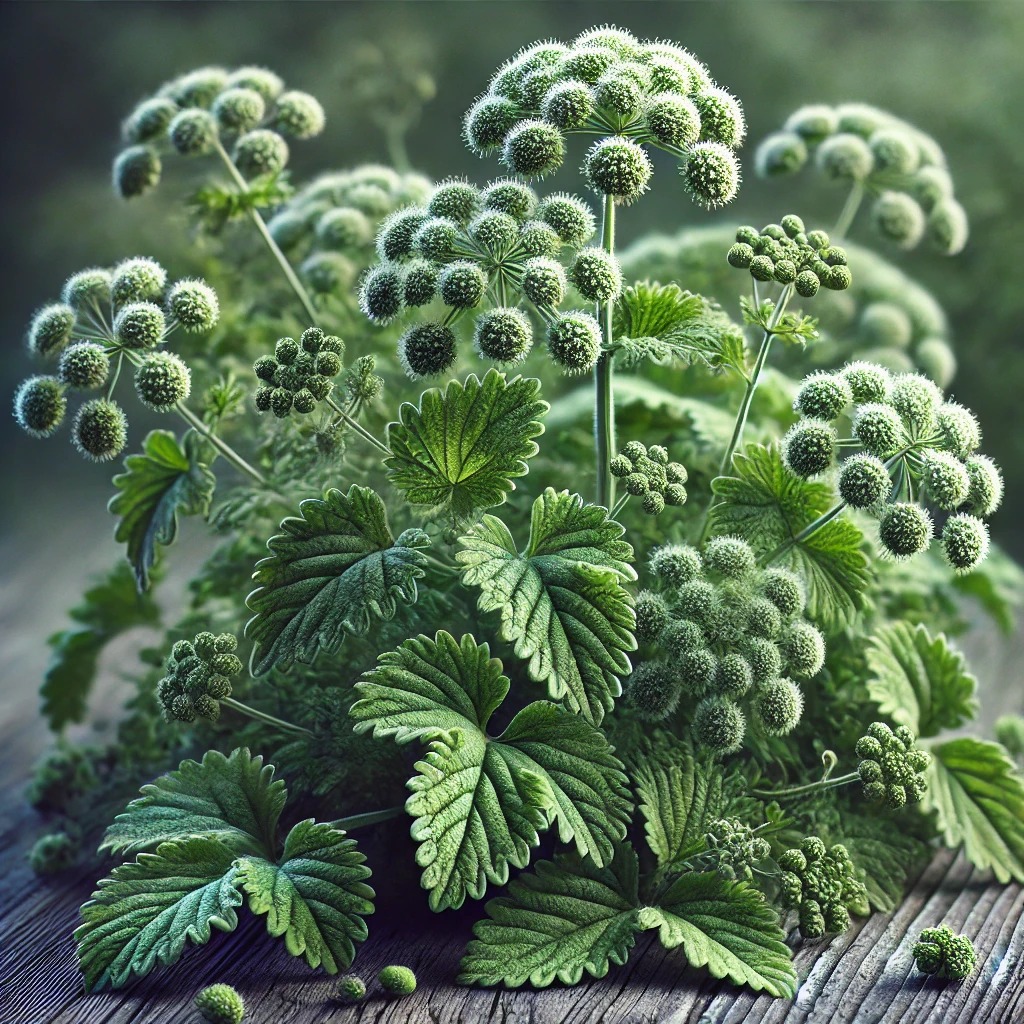Ajowan (Trachyspermum ammi)

Overview
Ajowan, also known as Bishop’s Weed, is a herbaceous plant renowned for its culinary and medicinal applications. Native to regions of India and the Middle East, it has a distinctive aroma and flavor reminiscent of thyme and is often used as a spice. Beyond its culinary uses, Ajowan boasts a wide array of medicinal properties attributed to its rich phytochemical composition, particularly thymol.
Medicinal Activity
Ajowan is associated with several important therapeutic activities, including:
• Antioxidant: Protects cells from oxidative stress and damage caused by free radicals.
• Antiseptic: Helps prevent infection by inhibiting the growth of pathogens.
• Antispasmodic: Alleviates spasms in smooth muscles, beneficial for digestive issues.
• Diuretic: Promotes urination, aiding in detoxification and fluid balance.
• Expectorant: Assists in clearing mucus from the airways, useful for respiratory conditions.
• Hypotensive: May help lower blood pressure, contributing to cardiovascular health.
• Vermifuge: Effective against parasitic worms, promoting gastrointestinal health.
• Antioxidant: Protects cells from oxidative stress and damage caused by free radicals.
• Antiseptic: Helps prevent infection by inhibiting the growth of pathogens.
• Antispasmodic: Alleviates spasms in smooth muscles, beneficial for digestive issues.
• Diuretic: Promotes urination, aiding in detoxification and fluid balance.
• Expectorant: Assists in clearing mucus from the airways, useful for respiratory conditions.
• Hypotensive: May help lower blood pressure, contributing to cardiovascular health.
• Vermifuge: Effective against parasitic worms, promoting gastrointestinal health.
Therapeutic Indication
Ajowan is indicated for a variety of health conditions, including:
• Respiratory Issues: Effective for asthma, bronchitis, and coughs, helping to ease congestion and promote lung function.
• Digestive Disorders: Beneficial for colic, dyspepsia, gas, and diarrhea, it aids in digestion and alleviates gastrointestinal discomfort.
• Infections: Demonstrates antibacterial properties against various pathogens, including E. coli and Salmonella.
• Inflammation and Pain: Used to alleviate symptoms of arthritis, rheumatism, and general pain, including toothache and headache.
• Skin Conditions: Applied topically for boils, wounds, and other dermatological issues due to its antiseptic properties.
Dosages
The recommended dosage for Ajowan is typically between 3 to 6 grams of the powdered seed per day. For concentrated extracts, around 125 mg is commonly suggested. It can be taken in various forms, including powders, teas, or capsules, depending on preference.
• Respiratory Issues: Effective for asthma, bronchitis, and coughs, helping to ease congestion and promote lung function.
• Digestive Disorders: Beneficial for colic, dyspepsia, gas, and diarrhea, it aids in digestion and alleviates gastrointestinal discomfort.
• Infections: Demonstrates antibacterial properties against various pathogens, including E. coli and Salmonella.
• Inflammation and Pain: Used to alleviate symptoms of arthritis, rheumatism, and general pain, including toothache and headache.
• Skin Conditions: Applied topically for boils, wounds, and other dermatological issues due to its antiseptic properties.
Dosages
The recommended dosage for Ajowan is typically between 3 to 6 grams of the powdered seed per day. For concentrated extracts, around 125 mg is commonly suggested. It can be taken in various forms, including powders, teas, or capsules, depending on preference.
Prepration & Usage
Preparation Methods
1. Powdered Seeds: The seeds can be ground into a fine powder and used in cooking or as a dietary supplement.
2. Infusions: Ajowan seeds can be steeped in hot water to create a herbal tea that aids digestion and relieves respiratory issues.
3. Essential Oil: Ajowan essential oil, rich in thymol, can be used topically or in aromatherapy, but should be diluted properly to avoid skin irritation.
1. Powdered Seeds: The seeds can be ground into a fine powder and used in cooking or as a dietary supplement.
2. Infusions: Ajowan seeds can be steeped in hot water to create a herbal tea that aids digestion and relieves respiratory issues.
3. Essential Oil: Ajowan essential oil, rich in thymol, can be used topically or in aromatherapy, but should be diluted properly to avoid skin irritation.
Safety & Considerations
While Ajowan is generally safe when used in culinary amounts, some precautions include:
• Pregnancy and Lactation: Use with caution as its effects during pregnancy are not well studied.
• Allergic Reactions: Individuals sensitive to plants in the Apiaceae family may experience allergic reactions.
• Gastrointestinal Distress: Excessive consumption may lead to gastrointestinal discomfort or irritation.
• Pregnancy and Lactation: Use with caution as its effects during pregnancy are not well studied.
• Allergic Reactions: Individuals sensitive to plants in the Apiaceae family may experience allergic reactions.
• Gastrointestinal Distress: Excessive consumption may lead to gastrointestinal discomfort or irritation.
Conclusion
Research highlights Ajowan’s potential health benefits, particularly its antifungal properties attributed to the presence of thymol. Studies suggest that Ajowan essential oil can inhibit the growth of various fungi at relatively low concentrations, showcasing its value in both culinary and medicinal applications.
